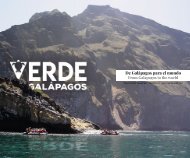Verde Galápagos #2
Te invitamos a leer nuestra segunda edición de la revista digital Verde Galápagos.
Te invitamos a leer nuestra segunda edición de la revista digital Verde Galápagos.
You also want an ePaper? Increase the reach of your titles
YUMPU automatically turns print PDFs into web optimized ePapers that Google loves.
verdE verdE galápagos<br />
jcomp / Freepik<br />
La conservación<br />
no basta, lo que el<br />
planeta necesita es<br />
sostenibilidad<br />
Es evidente que los múltiples proyectos de remediación<br />
y restauración ambiental que se<br />
han venido llevando a cabo a escala mundial<br />
en las últimas décadas han resultado exiguos:<br />
los índices de contaminación, deforestación,<br />
calentamiento global y la consecuente extinción<br />
de especies siguen en aumento. Todos los<br />
esfuerzos desplegados son insuficientes, tanto<br />
que es como si se tratara de un enorme navío<br />
al que se le han abierto huecos por todos<br />
lados y sus tripulantes estuviesen achicando<br />
con pocillos el agua que le entra a borbotones…<br />
mientras el barco empieza a hundirse.<br />
Hemos llegado a comprender que nuestro planeta<br />
no es una fuente inagotable de recursos.<br />
Ahora que hemos desarrollado la capacidad<br />
de avaluar el capital natural, nos hemos dado<br />
cuenta de que el costo del recurso natural que<br />
las industrias han utilizado para “producir” nunca<br />
ha sido considerado dentro del precio que<br />
pusieron a sus productos en los mercados: la<br />
factura de la minoría que sacó provecho de<br />
esa manera, la está pagando el planeta entero.<br />
Hemos montado un gigantesco aparato de<br />
producción y consumo que, además de nocivo<br />
para el medioambiente, es por demás<br />
ineficiente: se ha estimado que la cantidad<br />
de energía que se consume diariamente en<br />
el mundo es comparable a la que el planeta<br />
produce en 10.000 días (lo ideal sería que exista<br />
una equivalencia de día por día).<br />
Conservation is not<br />
enough, what is needed<br />
is sustainability<br />
Eduardo Neira,<br />
editor<br />
It has become clear that the multiple projects<br />
of remediation and environmental restoration<br />
that have been carried out worldwide in recent<br />
decades have been meager: the rates of<br />
pollution, deforestation, global warming and<br />
the consequent extinction of species<br />
continue to increase. All efforts deployed<br />
have not been enough, it is<br />
very much like a huge ship that has holes<br />
on all sides and its crew is bailing the water<br />
coming in spurts with buckets... while the ship<br />
begins to sink.<br />
We have come to understand that our planet<br />
does not have an endless supply of resources.<br />
Now that we have developed the ability to value<br />
natural capital, we have realized that the<br />
cost of natural resources that industries have<br />
used to “produce” has never been considered<br />
in the price of their products. The entire planet<br />
is paying the bill of the minority that has profited<br />
from this. We have set up a gigantic machine<br />
of production and consumption that, in<br />
addition to being harmful to the environment,<br />
is also inefficient. It has been estimated that<br />
the amount of energy consumed daily in the<br />
world is comparable to what the planet produces<br />
in 10,000 days (ideally, there should be<br />
a trade-off of one day for one day).<br />
4





